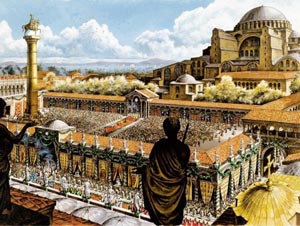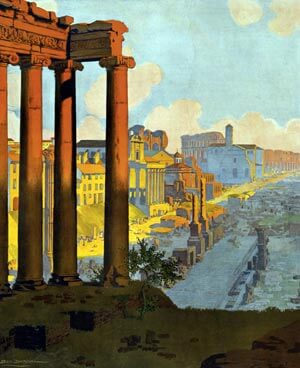
Heraclius at Greater Syria.
Look at the greatness of Islam, and the happiness one finds in their heart when they embrace it. This happiness remains in the heart and makes one forget about all the pains and troubles that they may have been through in their lives. The joy the Muslims feel upon applying their faith is far greater than any materialistic joy one can possibly experience in this life. If you really want to experience this happiness in your life, then you’ve got to take that bold step.
Witness the following words of Abu Sufyan Bin Harb when he said: “Heraclius, upon receiving a letter from Prophet Muhammad called for us while we were in Shaam.” (This is a historic region in the Middle East bordering the Mediterranean. It is generally considered to include the modern states of Syria, Lebanon, Palestine, and Jordan) He said: “Heraclius’s messenger found us somewhere in the Greater Syria area, so he took me and my companions to Jerusalem, and we were admitted into the presence of Heraclius. We found him sitting in his royal court wearing a crown, surrounded by the senior Byzantine dignitaries.
He said to his translator. ‘Ask them who amongst them is a close relation to the man who claims to be a prophet.’”
Abu Sufyan added, “I replied: ‘I am the nearest relative to him.’ He asked, ‘What degree of relationship do you have with him?’ I replied, ‘He is my cousin,’ and there was none from the tribe of Abd Manaf in the caravan except myself. Heraclius said, ‘Let him come nearer.’ He then ordered that my companions stand behind me near my shoulder and said to his translator, ‘Tell his companions that I am going to ask this man about the one who claims to be a prophet. If he tells a lie, they should contradict him immediately.’”
Abu Sufyan added, “By Allah y, had it not been for shame that my companions brand me a liar, I would not have spoken the truth about him when he asked me. But I considered it shameful to be called a liar by my companions, so I told the truth.” “He then said to his translator, ‘Ask him what kind of family he belongs to.’ I replied, ‘He belongs to a noble family amongst us.’ He said, ‘Has anybody else amongst you ever claimed the same before him?’ I replied, ‘No.’
He said, ‘Have you ever blamed him for telling lies before he claimed what he claimed?’ I replied, ‘No.’ He said, ‘Was anybody amongst his ancestors a king?’ I replied, ‘No.’ He said, ‘Do the noble or the poor follow him?’ I replied, ‘It is the poor who follow him.’ He said, ‘Are they increasing or decreasing (daily)?’ I replied, ‘They are increasing.’ He said, ‘Does anybody amongst those who embrace his religion become displeased and then discard his religion?’ I replied, ‘No.’ He said, ‘Does he break his promises?’ I replied, ‘No, but we are now at truce with him and we are afraid that he may betray us.’”
Abu Sufyan added, “Other than the last sentence, I could find no opportunity to say anything against him.”
By God, I became surer and surer that his religion would be victorious till I ended up accepting Islam
Heraclius then asked, “Have you ever had a war with him?’ I replied, ‘Yes.’ He said, ‘What was the outcome of your battles with him?’ I replied, ‘Sometimes he was victorious and sometimes we.’ He said, ‘What does he order you to do?’ I said, ‘He tells us to worship God alone, and not to worship others along with Him, and to leave all that our forefathers used to worship. He orders us to pray, give in charity, be chaste, keep promises and return what is entrusted to us.’”
“When I had said that, Heraclius said to his translator, ‘Say to him: I asked you about his lineage and your reply was that he belonged to a noble family. In fact, all the Messengers before came from the noblest lineage of their nations.
Then I questioned you whether anybody else amongst you had claimed such a thing, and your reply was in the negative. If the answer had been in the affirmative, I would have thought that this man was following a claim that had been said before him.
When I asked you whether he was ever blamed for telling lies, your reply was in the negative, so I took it for granted that a person who did not tell a lie to people could never tell a lie about God.
Then I asked you whether any of his ancestors was a king, your reply was in the negative, and if it had been in the affirmative, I would have thought that this man wanted to take back his ancestral kingdom.

Poster showing the Roman Forum at dawn; George Dorival, artist. 1920
When I asked you whether the rich or the poor people followed him, you replied that it was the poor who followed him. In fact, such are the followers of the Messengers. Then I asked you whether his followers were increasing or decreasing. You replied that they were increasing. In fact, this is the result of true faith till it is complete [in all respects].
Then I asked you whether there was anybody who, after embracing his religion, became displeased and discarded his religion, and your reply was in the negative. In fact, this is the sign of true faith, for when its pleasure enters and mixes in the hearts completely, nobody will be displeased with it.
And I asked you whether he had ever broken his promise. You replied in the negative. And such are the Messengers; they never break their promises.
When I asked you whether you fought with him and he fought with you, you replied that he did and that sometimes he was victorious and sometimes you. Indeed, such are the Messengers; they are put to trials, yet the final victory is always theirs.
Then I asked you what he ordered you. You replied that he ordered you to worship God alone and not to worship others along with Him, to leave all that your forefathers used to worship, to offer prayers, to speak the truth, to be chaste, to keep promises, and to return what is entrusted to you. These are really the qualities of a prophet who, I knew [from the previous Scriptures] would appear, but I did not know that he would be from amongst you. If what you say is true, he will very soon occupy the earth under my feet, and if I knew that I would reach him definitely, I would go immediately to meet him; and were I with him, then I would certainly wash his feet.’”
Abu Sufyan added, “Heraclius then asked for the letter of the Messenger of God and it was read. Its contents were the following: ‘I begin with the name of God, the most Beneficent, the most Merciful. [This letter is] from Muhammad, the slave of God, and His Messenger, to Heraclius, the Ruler of the Byzantine Empire.
Peace be upon the followers of guidance. I invite you to surrender to God [Islam]. Accept Islam and you will be safe; accept Islam and God will bestow on you a double reward. But if you reject this invitation of Islam, you shall be responsible for misguiding your nation.’
‘Say, ‘O People of the Scripture, come to a word that is equitable between us and you - that we will not worship except Allah y and not associate anything with Him and not take one another as lords instead of Allah y.’ But if they turn away, then say, ‘Bear witness that we are Muslims [submitting to Him].’” (3:64)
Abu Sufyan added, “When Heraclius had finished his speech, there was a great hue and cry caused by the Byzantine dignitaries surrounding him, and there was so much noise that I did not understand what they said. So, we were ordered out of the court.”
“When I went out with my companions and we were alone, I said to them, ‘Verily, Ibn Abi Kabsha’s (Ibn Abi Kabsha: a nickname of the Prophet Muhammad) affair has gained power. This is the King of the Romans fearing him.’”
Abu Sufyan added: “By God, I became surer and surer that his religion would be victorious till I ended up accepting Islam.” (Bukhari #2782)
